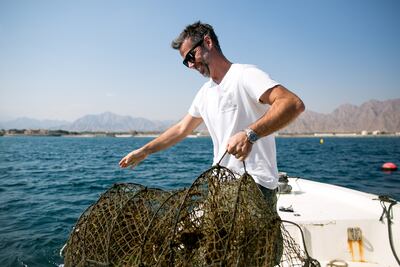As a source of pearls, the oyster has for centuries been closely entwined with the history and traditional culture of the UAE.
Other industries have long since taken over from pearl diving, but the farming of oysters — for food — has in recent years been thriving off the Emirates' east coast.
Aquaculture in general has sometimes been associated with environmental harm, but the production of oysters, which are bivalve molluscs, is often cited as having a positive impact on the natural world.
Tying in with this, Dibba Bay Oysters farm in Fujairah recently secured Friend of the Sea Sustainable Aquaculture certification through a programme run by the Italian-based World Sustainability Organisation, after its aquaculture facilities were found to meet strict sustainable policies and waste management regulations.
Friend of the Sea programme
Paolo Bray, founder and director of the Friend of the Sea programme, said that oyster farms often improve biodiversity because they increase the surface area of a habitat as much as 50-fold.
He said this leads to greater numbers of sea creatures such as barnacles, anemones and hooked mussels, some of which provide food for predators.
“These oyster reefs are used as spawning areas,” Mr Bray said. “Farming bivalves is very often a low-impact way of producing animal protein compared to the farming of fish in general.”
Oysters filter the water and can sequester carbon, so have a positive impact in terms of carbon emissions, Mr Bray said.
Oysters' positive impact

Demand for seafood is growing globally, and aquaculture — the cultivation of fish, crustaceans, molluscs and other aquatic organisms — accounts for much of the increased output.
For the past 35 years, the amount of fish and other marine organisms captured from the wild has remained roughly stable at between about 75 and 86 million tonnes a year, according to figures published by the United Nations’ Food and Agriculture Organisation (FAO).
Harvests are not likely to grow because stocks are already under significant pressure.
Meanwhile, aquaculture in inland waters has increased its output from six million tonnes a year in 1987 to 54 million tonnes in 2020, while annual output from aquaculture in marine waters rose from four million tonnes to 33 million tonnes.
Aquaculture, particularly when it involves rearing fish, has sometimes been linked to environmental damage, such as through the build-up of nutrients from fish feed and waste, which can lead to algal blooms that deplete waters of oxygen.
However, oysters do not have to be fed and while they do produce solid waste, this is not harmful to the surrounding waters.
Welfare is much less of a factor than with finned fish, where concerns have been raised over, for example, lice infestations.
“The fact that no feed is needed and there’s no need to use additional chemical substances or growth hormones, as you’re finding with finned fish normally, [means] the impact on the environment is much less,” Mr Bray said.
“[Consumers] should have less concern as far as oyster welfare during the farming phase and transport phase compared with fish species.”
Environmental certification schemes for seafood can have a significant impact, Mr Bray indicated, citing a dolphin-safe tuna programme he has previously been involved with, which he said reduced the accidental catching of dolphins by more than 90 per cent in one area.
Friend of the Sea certification has been awarded to more than 1,500 companies in over 80 countries, and can assist farms by, for example, offering networking opportunities with potential buyers interested in sustainable products. Other oyster farms certified are in Australia, Italy, Monaco and the UK.
Criteria farms are assessed on include impact on important habitats, complying with water quality standards, not using harmful antifouling agents or growth hormones, and managing waste and energy use well.
Supplies the UAE market

Ramie Murray, chief executive of Dibba Bay Oysters farm, said that the company’s operations were “low intensity”, adding that the nets holding the oysters were “as a floating reef” that created habitats for other marine life.
“We’ve got them very spread out,” he said. “They’re feeding naturally from phytoplankton. They build their shells from the minerals they find in the water.”
Mr Murray said, however, that the farm’s biggest positive environmental impact was that it supplied the UAE market with oysters that would otherwise be flown in. The farm has approximately 35 per cent share of the oyster market in the Emirates.
It is the only oyster farm of its kind in the Middle East and cultivates Pacific oysters, which are originally from Japan.
The farm grew “quite slowly at the beginning” but has since expanded faster and now produces 300,000 to 400,000 oysters per month. Mr Murray said production could be increased to 800,000 per month.
Mr Murray said the farm applied for Friend of the Sea certification because it was a fully third-party, which he contrasted with some other certification programmes with roots in the industry.
He said the company was “very happy with the rigour” of the certification process, which involved having to document many procedures around how the company works.
As well as exports to other GCC countries, Dibba Bay sends its oysters to the Maldives, the Seychelles, Malaysia, Mauritius and Hong Kong, which Mr Murray said typically sources oysters from France or the United States.
“There’s the carbon emissions from us exporting [to Hong Kong], but it’s less than half from France of the USA,” he said. “China is an enormous producer, but it consumes them all.”
Dibba Bay’s environmental impact also includes efforts to support a coral nursery project to recreate coral reef ecosystems using oyster shells.
Discarded oyster shells used to help create artificial reefs in the UAE — in pictures
























